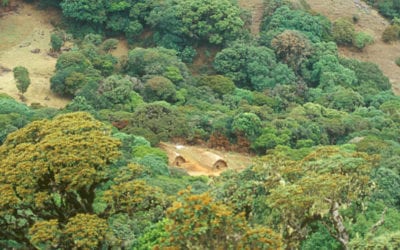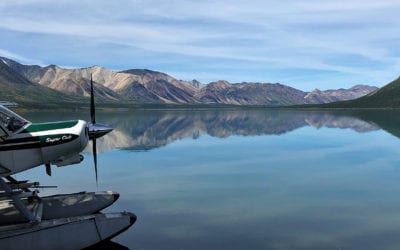Bushfire Sky Photoby: frogpondsrock on Flickr
Of Global Concern: Reliance upon Resilience
Editorial Perspectives
April 2020 | Volume 26, Number 1
With the beginning of 2020, we move into a new decade for global conservation and wilderness protection. Each year brings the opportunity to revitalize efforts to grow a constituency that advocates for the preservation of vital global resources. For such a constituency to exist and thrive, it is crucial that we address those incidents and events that occur on a scale that warrant the world taking notice.
Recently, we saw the conclusion of 240 days of bushfires in New South Wales, Australia. As these fires burned in late 2019 through early 2020, more than 18 million acres were affected. Professor Chris Dickman from the University of Sydney has conservatively estimated that 800 million animals were killed in these bushfires, with a national impact to more than 1 billion animals (University of Sydney 2020). These events certainly made the world take notice. From Instagram photos and Twitter posts of injured koalas, to media coverage and GoFundMe fund-raising efforts, citizens across the globe focused their attention on New South Wales.
Many indicators and drivers can be identified to help understand the scale and magnitude of the Australia bushfires. Habitat fragmentation across Australia has weakened ecosystems and natural processes. Invasive species have outcompeted endemic species and threaten biodiversity. And global climate change has fundamentally altered how Australian landscapes and its species can resist, respond to, and recover from such events. But what may be most concerning is whether we have reached a critical tipping point where we can no longer rely upon the resilience of nature. Previously, ecosystem adaptation, resistance, and resilience buffered natural fires, droughts, and other events. However, that is not the reality of our ecosystems today. Human manipulation and modification now fundamentality influence how nature can react.
There is no argument that the Australia bushfires are of global concern, but what may be of more concern is the lack of a greater resonance across the globe. If nature can no longer react and respond to threats, then nature must rely upon us. Just as nature can be resilient, so too can we as advocates for global conservation and preservation. We must adapt to change, resist and overcome challenges, and be resilient in the face of adversity. We must seize upon the attention and global concern over events such as the Australia bushfires to further make the argument that responses to climate change and ecological threats need to happen now. Because we can no longer rely upon nature’s resilience or wait until another decade passes to act.
In this issue of IJW, we explore the influence of trails on wilderness perceptions. Tarun Chhabra examines the Toda people as stewards of wilderness and biodiversity. Dani Dagan, Ryan Sharp, Matthew Brownlee, and Emily Wilkins investigate the uses of social media data in remote wilderness settings. And Kathryn Sutcliffe discusses the implications of Instagram representations for wilderness management.
ROBERT DVORAK is editor in chief of IJW and professor in the Department of Recreation, Parks, and Leisure Services Administration at Central Michigan University; email: dvora1rg@cmich.edu.
References
University of Sydney. 2020. More Than One Billion Animals Killed in Australia Bushfires. https://sydney.edu.au/news-opinion/news/2020/01/08/australian-bushfires-more-than-one-billion-animals-impacted.html, accessed March 3, 2020.
Read Next
Wilderness Trails: Influences of Perceptions
Wilderness areas may not be perfect, and there may be some rules, but without a doubt they benefit society, and it is imperative that society can access those benefits. Trails are a perfect guide leading people to those benefits.
The Toda People: Stewards of Wilderness and Biodiversity
At a period when humankind appears to be so disconnected with nature that they assume their species can survive without respecting other forms of life, it might be pertinent to see how a traditional Toda mind is trained to interact with nature.
Social Media Data in Remote and Low-Use Backcountry Areas: Applications and Limitations
This article evaluates data from user-generated content related to two national parks in Alaska. One season of Twitter and Flickr posts was collected, coded for content, and mapped if geographic data was available.



